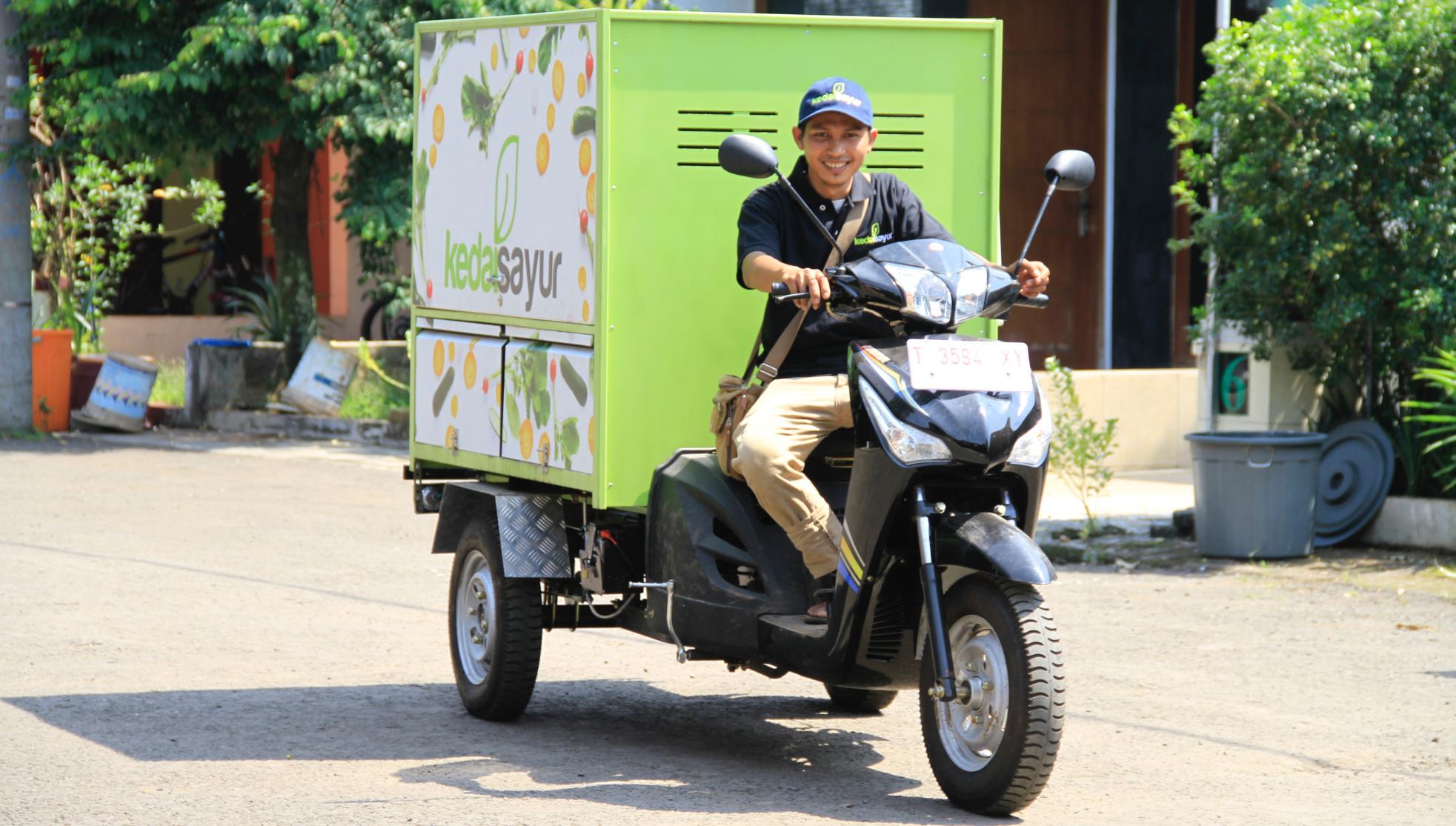Few things are more interesting than the convergence of old and new. It’s with that in mind that we once again look to Indonesia, where EAST VENTURES, an early-stage VC that’s behind a project to digitize the country's street vendors, has backed a new startup that is modernizing street vendors who sell fresh produce.
In Indonesia — and other parts of Southeast Asia — street-based vendors are a common and important part of local life. Best known for street food, they also span general convenience kiosks and sellers of fruit, vegetables and snacks, who often operate through cycle-based mobile “stores.”
The focus for Kedai Sayur, which means “vegetable store” in Bahasa, is mobile vegetable sellers. The six-month-old startup aims to bring the benefits of the digital economy to these humble “hawkers” in Indonesia.
Perhaps the most important focus of the business is that it helps hawkers get better pricing when it comes to sourcing their produce. As things stand currently, the procurement process is dogged by issues. Most notably that’s a long supply chain that adds cost — prices increase as more middlemen take their cut — and means that vegetables are less fresh by the time they reach the hawker.
To combat that, Kedai Sayur groups together orders and negotiates better-than-retail rates for its hawkers, who order their produce through an app. Orders are made by 6pm each day, and delivered to hawkers by 5 am the next morning, Kedai Sayur co-founder and CEO Adrian Hernanto told TechCrunch in an interview.
The startup also provides hawkers with a financial float that allows them to upsize their order without necessarily having the money up front, as is currently required. So, for example, they can double their orders for a day if they believe that one particular vegetable can sell beyond what they usually stock.
“The problem is bargaining power between hawkers and distributors,” Hernanto explained. “They trade in small quantity but across many products, and that’s why they can only get retail price.”
With the working capital — which is not a loan — he explained that hawkers can “order as much as they can sell and then pay later after they receive payment from customers.”
“We want to remove their working capital limits,” he added.
Full repayment is required before a hawker can make their next order, said Hernanto.
Distribution is also an area for modernization. Kedai Sayur offers an app for consumers that allows customers to order produce remotely, which the hawker can then deliver. This augments trade that hawkers traditionally do offline and, according to Hernanto, combined with working capital, some vendors have increased their take-home profit three or four-fold.
The most visibly striking part of Kedai Sayur’s offering to hawkers is an upgraded mode of transport: three-wheeled vehicles that are brightly branded and contain a chiller section to keep produce cool. They can be leased from the company to replace the typically dowdy bike-based kiosks that are synonymous with hawkers.
Beyond nicer aesthetics, there are practical benefits. Hernanto said the new transport can open up other avenues for making money.
That’s because the storage section is removable and can be set up as a kiosk. Hernanto said some enterprising hawkers sell coffee, bread and other daily products on the street or at night markets, in addition to their vegetable sales.
Potentially there may be other options in the future based around logistics. Kedai Sayur is in talks with prospective partners about teaming up to deliver parcels and more.
“Hawkers are the neighborhood logistics experts. There is potential to utilize them for last-mile delivery as they already have a vehicle and know the neighborhoods well,” explained Hernanto — whose co-founders include Ahmad Supriyadi, whose mother was a vegetable hawker, and Rizki Novian.
One area where the Kedai Sayur offering is lacking right now is digital payments, as most transactions are handled in cash, despite a proliferation of mobile wallets from all manner of companies, including ride-hailing unicorns Grab and Go-Jek.
Most hawkers are comfortable with cash — it is, after all, the tradition — but it makes paying the working capital back somewhat cumbersome. Cash requires Kedai Sayur to dispatch an agent to collect any outstanding money from the previous order before a new order can be made, but more fundamentally, moving cash around is messy.
The startup currently works with Alfamart’s retail-based payments for offline over-the-counter payback, and it takes a chunk of payments via bank transfer, but Hernanto said cash accounts for some 55% of collections.
That could change in the future as there are plans to add digital services like OVO — which is part-owned by Grab — and Go-Pay from Go-Jek. That’ll make collecting money easier, and it might also appeal to consumers who buy the products, too.
On the subject of collecting money, Kedai Sayur is — like many early-stage startups — currently in “growth mode.” Hernanto believes it will become sustainable through revenue collected on margins between selling product to hawkers and sourcing — which he sees at 20-30% — as well as a delivery fee charged to bring products to hawkers. In the future, he sees the potential to introduce more formalized financing in the future, which also could drive revenue whilst helping provide new financing options.
“When hawkers join our system, they become bankable,” he said. “We see the potential for microloans to hawkers in the future.”
After six months of operations in Jakarta, Kedai Sayur has reached more than 2,000 hawkers, according to Hernanto, with 60% growth on a monthly basis. He isn’t providing revenue details, but the company said in a press release that GMV — the total amount of product bought from its hawkers — has grown five-fold in the past four months. Finally, and importantly, the startup also this week announced a $1.3 million seed investment from East Ventures.
As mentioned at the top, the startup fits with East Ventures’ thesis of using tech to augment traditional business.
In the case of Warung Pintar, the startup focused on street kiosk vendors that spun out of East Ventures, the project has shown enough potential to merit a $27.5 million Series A round that closed earlier this year. The VC firm will be hoping for the same from Kedai Sayur, which has already started planning for its next round of funding, according to Hernanto.
“Door-to-door vegetable hawkers probably had existed for hundreds of years in Indonesia. Surprisingly, they are still available in today’s modern society, standing side-by-side with the fast-growing modern supermarket and convenience store. In fact, the vegetable hawkers are one of the most convenient ways to get our daily produce,” said Willson Cuaca, East Ventures co-founder and managing partner, in a statement.
“Kedai Sayur fits into two of East Ventures’ hypothesis. The first one, technology inclusion to upgrade the underserved merchant accessing technology, and second, improvement of Indonesia supply chain. There is local wisdom that helps traditional on-demand vegetable hawkers to exist for so long and we want to preserve that culture with a touch of technology,” Cuaca added.
Hernanto, meanwhile, is optimistic that the business can expand to other countries, most likely those in Southeast Asia. For now, though, he is looking at expansion into three new cities beyond Jakarta next year before gearing up to venture overseas at a later date. As the world’s fourth largest country by population and Southeast Asia’s largest economy, Indonesia remains the priority.


